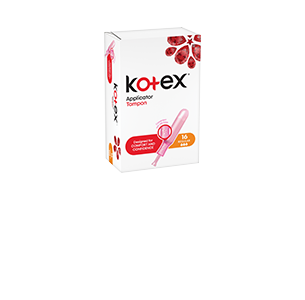Find the answers to all of your questions right here.
My Period
How much blood do I lose during my period?
On average a woman loses 3 - 5 tablespoons of blood and tissue during her period. This varies from 75 ml’s (quarter of a cup) to 125 ml’s (half a cup) at most.
Why does my period not come on the same date every month? Should I be worried?
No, you don't need to worry! It is normal for periods not to come on the same date every month – so don’t be worried if this happens to you. This is because periods come in cycles – a cycle is from the first day of one period to the first day of the next period – and not strictly months. A cycle is usually about 28 days, but because they are controlled by hormones, emotions, diet, health and life-style, they can be shorter (21 days) or longer (sometimes up to 90 days). This means that your period can come earlier or later than you expected.
I get my period twice a month, is that normal?
If you have a period at the beginning of the month, and another towards the end of the month, this simply means that you have a short cycle. A cycle is from the first day of one period to the first day of your next period. It takes a couple of years for your cycles to ‘settle down’ which means that for the first few years of having periods, some cycles will be short (maybe 21 days) while others will be longer. The length of a cycle depends on when you ‘ovulate’ or ripen an egg. If you ovulate early in the cycle, you will have your period earlier. If you ovulate later, your period will start later. This is quite normal and nothing to worry about!
Can I have sex during my period?
Married women having sex during a period is a personal choice. While some women are comfortable to have sex when she’s bleeding, it’s also OK for married women not to have sex during this time. Besides, not all husbands are comfortable having sex with a woman who is bleeding. Young women having ‘casual’ sex or multiple sex partners need to be warned though that having sex during a period is very risky and should be avoided. Here's why: 1. Carries the risk of pregnancy (if she has a short cycle). 2. Carries a huge risk of sexually transmitted infections because of the blood environment of the vagina. 3. Her cervix (mouth of the womb) is open during her period time giving infections – bacterial, fungal or viral – an open door into her womb, tubes, pelvis and abdomen. 4. A Sexually Transmitted Infection can become a Sexually Transmitted Disease - often FOR LIFE! 5. Some viruses like the Human Papillomavirus (HPV) increases a woman’s risk of also getting cervical cancer and others like Chlamydia can cause infertility.
How often must I change a pad/tampon?
While some women may need to change their pads/tampons more often (especially on the first and second day of your period) you should change 3 - 4 hourly.
Why do girls have periods?
Girls have periods because they’re SPECIAL! Girls have something called a womb – that’s why we’re called ‘woman’ – a man with a womb! We have all the qualities of a man but with something extra – an organ (the size of your fist) that prepares for a baby, then s-t-r-e-t-c-h-e-s with a growing baby for 9 months! Amazing! Nature and modern living clash a bit here because when a young girl starts to have her periods; it means that she is preparing an egg and her womb for a pregnancy! Too young and not ready for motherhood yet, young girls have to learn to cope with a cycle ‘bleeding’ or ‘cleaning-out’ of the womb – on average every 28 days. Think of it this way – menstruation is a celebration of your womanhood – and this bleeding lets you know that your body is working the way it should be!
I usually skip a month before my next period, is that normal? What causes that?
It sounds as though you are having longer cycles – a cycle is from the first day of one period to the first day of your next period. It’s OK to have longer cycles! Sometimes events in your life can delay ‘ovulation’ or the ripening of an egg. When this happens, periods come later. If a woman is not sexually active, she does not have to worry if her period comes later. Other causes of delayed ovulation are: 1. Stress 2. Extreme exercise 3. Extreme dieting (anorexia) 4. Emotional distress.
Can I go swimming during my period?
Of course you can go swimming during your period! Just make sure you wear a tampon and not a pad!
Will I lose my virginity if I wear a tampon?
Having sex is the only way to lose your virginity. Your choice of period protection has no affect at all, so there's no reason why you should not use tampons before you're sexually active.
When I am on my period, can I be around boys?
Yes you can be around boys when you are having a period. Boys don’t know that you are having a period unless you tell them.
What's the appropriate age to start menstruation?
Starting menstruation can be anytime from the age of 8 to 18! It all depends on our life-style and genetic make-up. Girls who are very sport orientated and are tall and ‘skinny’ are more likely to start puberty and have their periods when they’re older. A girl who starts to develop breasts when she is younger is more likely to start her periods when she is younger. Interesting fact – girls who start their periods younger tend to stop having their periods when they are older than 50. Girls who start their period later usually stop having their period earlier – sometimes in her mid-40’s!
What should I do when I get my period for the first time?
Attach the pad to the gusset of the panty. Change your pad at least every 4 hours. Wrap the used pad with toilet paper or in the packet provided. Carry on with the day as though nothing is happening!
My sister is 21. She had a "one day" period this month. Is this normal? What cuases this? Should she be worried?
Hi. If this has not happened to your sister before and she had sex about two weeks before this one-day-period, one explanation could be that she is pregnant. When the fertilized egg burrows into the lining of the womb (called the endometrium that becomes a period) it can cause a slight bleed. Women think that this is a period when in fact she is pregnant. I would suggest that she buys herself a home pregnancy-test kit. Other signs of pregnancy are breasts that feel ‘fuller’, nausea in the morning, feeling emotional and needing to P more often. Other reasons for a very light, short period may be after having the contraceptive injection (this in fact stops periods after a while), the first period after taking the contraceptive pill or having the new contraceptive ‘rods’ inserted. In this case, your sister could speak to the clinic sisters about it but I am sure they will tell her that this may simply be her body ‘adjusting’ to the contraceptive hormones. I hope this advice helps.
What happens if I have unprotected sex (pull out method) days before my period?
OK – ‘reverse-gear’ sex is not safe because sperm have little tails and these help them to swim. However, having any sex before a period is ‘safer’ – as far as protection from pregnancy goes. BUT unprotected sex leaves you open and vulnerable to some 35 sexually transmitted infections. NOT a good idea ….!!!
My breasts always hurt right before my period, why?
This is called ‘cyclical’ breast changes that begins when women start to have their periods and continues every cycle till menopause. Breast changes begin mid-cycle when her hormone levels are high. Then just before her period, low hormonal levels trigger menstruation. This can make the breasts feel heavier and uncomfortable. Make sure you wear a well-supporting, comfortable bra during this time.
What causes a heavy flow?
For some women a heavy flow is in their genes - in other words, her Mom may have had heavy periods. Some women have heavier periods when they have more fatty tissue to store the hormone called oestrogen. Oestrogen is the hormone that helps the lining of the womb to grow. More oestrogen = thicker lining = heavy period. If a period comes late, the flow may be heavier.
What does it mean when a female gets her periods before her usual time?
Hi. Having a period earlier is not a problem – it simply means that you have had a shorter cycle. A cycle is from the first day of one period to the first day of your next period – the average number of days is usually 28 (sometimes cycles are shorter – sometimes they are longer and this is normal). This is nothing to worry about!


 Kenya
Kenya Nigeria
Nigeria 



